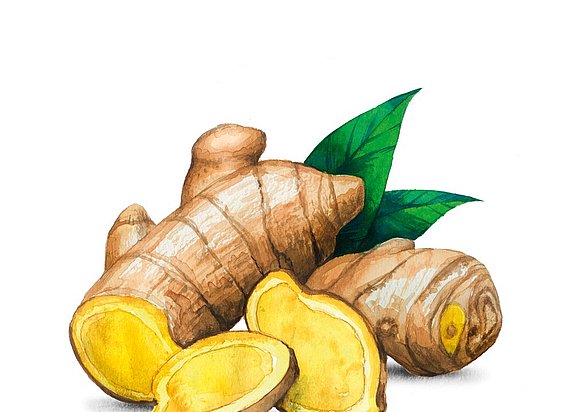Ginger
From the tropics to the entire world
Originally found in the tropics and subtropics, ginger (Zingiber officinale) is a plant that is highly valued all over the world, both in the kitchen as a strongly flavoured, spicy food and as a medicinal herb. The most important constituents are the essential oils and pungent substances (gingerols and shogaols), which are contained in the “rootstock” (botanical term: rhizome = underground stems) of the plant.
The ginger root has been part of the canon of plant therapy from India to the Far East for thousands of years. Here in Europe, ginger has been known as a medicinal plant in monastic medicine since the Middle Ages. Arab scholars, who had preserved and developed the medical knowledge of the great Greek physicians of late antiquity that the West had lost, spread the news of the healing qualities of plants such as ginger, first to southern Italy and then over the Alps and into our monasteries. Ginger is probably best known from Hildegard von Bingen's classic work on health and healing, "Physica" from the same period.
Ginger may be used in many ways. While Hildegard von Bingen limited the use of ginger root to strengthening the sick, for centuries seafarers ate pieces of ginger to prevent seasickness. Today, many people drink hot "ginger-water" especially in the colder months, either simply to warm themselves, or to support the body's natural defences. All you have to do is cut a piece of ginger root into thin slices and pour boiling water over it.
Ginger is now scientifically recognised for use as a digestive agent as well as for travel sickness and mild gastrointestinal complaints. Matthias Melzig, Professor of Pharmaceutical Biology at the Freie Universität, Berlin stated in a radio interview: The pungent substances cause an increased release of digestive enzymes and digestive juices, thus the digestion of proteins and fat in particular, and of course also of carbohydrates, are stimulated. Since ancient times, the use of ginger has always been associated with treatment of diseases of the digestive tract.*
In Ayurvedic medicine, ginger is even used for the treatment of migraines.
For patients who take anticoagulant drugs, ginger should be used with caution, because it can affect haemostasis.
* from an interview by Deutschlandfunk, broadcast on 03/05/2016 for the programme "Sprechstunde" (Consultation), retrieved from the recording on
